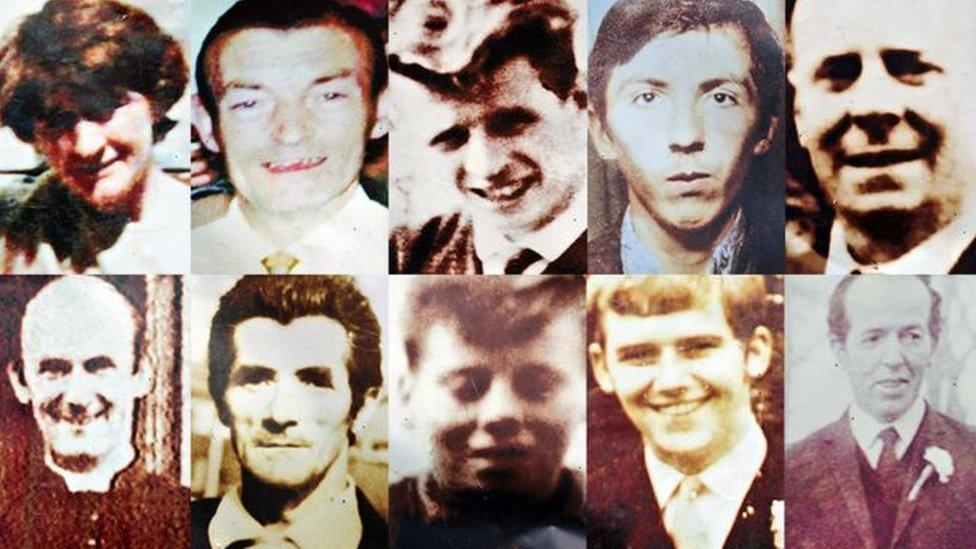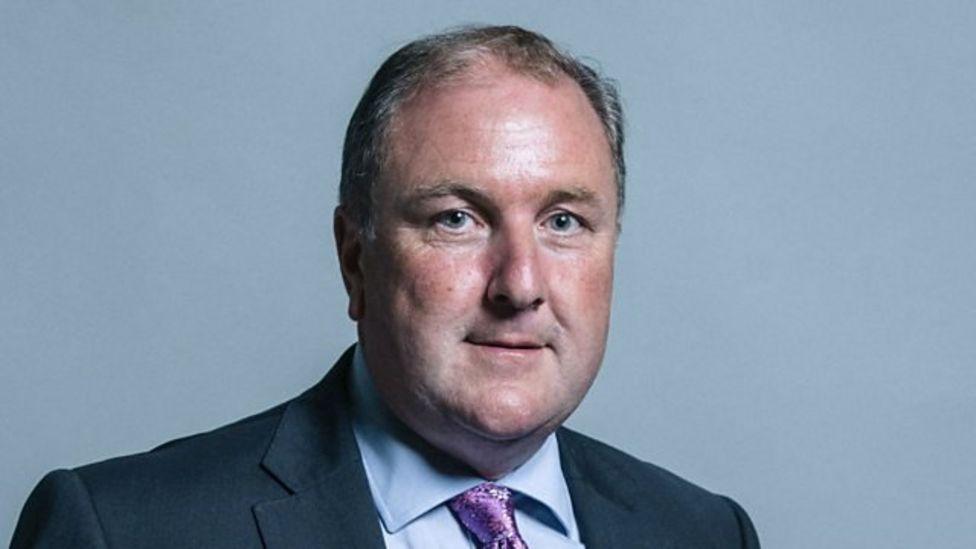Ballymurphy: Boris Johnson apologises in House of Commons
- Published
Boris Johnson says he is sorry for the pain the Ballymurphy victims' families have endured
The prime minister has publicly apologised to the families of the 10 people killed in Ballymurphy in 1971
Boris Johnson began prime minister's questions on Wednesday by reading the names of the victims.
He went on to say that he was sorry for how the investigations were handled and for the pain endured by the families.
Last week an inquest found that the victims, who were shot during an Army operation in Belfast, were "entirely innocent".
Mr Johnson told the House of Commons: "No apology can lessen their lasting pain, I hope they may take some comfort in the answers they have secured and in knowing this has renewed the government's determination to ensure in future that other families can find answers without distress and delay."
'Totally unacceptable'
John Teggart, whose father Daniel was one of those killed in Ballymurphy, has called Boris Johnson's apology "totally unacceptable" and said he "personally rejects it".
Speaking to BBC Radio Foyle, Mr Teggart labelled Mr Johnson's apology "totally insincere" and said it "again has caused annoyance to the families".
Mr Teggart ruled out ever meeting the prime minister and said he "wouldn't waste a minute of his time with him".
"I won't be letting him annoy me anymore, I have no time for him and his feeble attempts to apologise," Mr Teggart said.
He said Mr Johnson's apology should have focused on "our loved ones who were murdered" and not how the investigation was handled.
Allow X content?
This article contains content provided by X. We ask for your permission before anything is loaded, as they may be using cookies and other technologies. You may want to read X’s cookie policy, external and privacy policy, external before accepting. To view this content choose ‘accept and continue’.

Mary Kate Quinn, whose uncle John Laverty was killed in Ballymurphy, said the Balllymurphy families "were not informed" that Mr Johnson was making a statement on Wednesday in the House of Commons.
In a tweet, Ms Quinn said: "We found out from journalists. Yet again, that was not an apology. Boris did not apologise for the killings of our loved ones."

The inquest examined the deaths of 10 people in Ballymurphy in 1971
Among the victims were a priest who was trying to help the wounded and a mother of eight.
Nine of the 10 victims were killed by the Army, the coroner said.
However, Mrs Justice Keegan said she could not definitively rule who shot the tenth victim, former World War Two soldier John McKerr.
Families of the victims received a written apology from Mr Johnson last week, which they said had angered them.
They said the letter was received minutes before Northern Ireland Secretary Brandon Lewis apologised in Parliament for "the events at Ballymurphy" in 1971.
Mr Lewis said the events at Ballymurphy should never have happened.
'Right thing'
Mr Johnson also told Parliament that the UK government was committed to introducing legislation in the current session to address the legacy of the Troubles.
"And to introduce a fair package for veterans as well, to protect them from unfair, vexatious litigation where no new evidence has been brought forward," Mr Johnson said.
The government is to bring forward legislation in the course of the next year to deal with legacy issues related to the Northern Ireland Troubles.
Based on details of the plan leaked in recent weeks, it is proposed that all prosecutions prior to 1998 and related to the Troubles will, in future, be banned under a statute of limitations.

Simon Hoare, Northern Ireland Affairs Committee chair, said it was right for the prime minister to apologise
Sinn Féin president Mary Lou McDonald said Mr Johnson had added "insult to injury".
"I don't think that he has delivered anything that approximates a sincere or complete apology," Ms McDonald said.
"The bigger problem beyond that is that Boris Johnson and his government are determined to deliver an amnesty for British soldiers."
SDLP leader and Foyle MP Colum Eastwood said Mr Johnson's apology was "too little, too late".
"I don't know why he couldn't make a proper apology to the families last week when he had many, many opportunities," Mr Eastwood said.
"He didn't actually apologise for their loved ones being killed by British soldiers. I just think it was frankly insulting to the victims."
Mr Eastwood said the prime minister should have met the families in Belfast.
Simon Hoare, Northern Ireland Affairs Committee chair, said he had hoped the prime minister would give an apology and he was pleased that he had now done so.
"I think it was the right thing for the prime minister to do," Mr Hoare said.